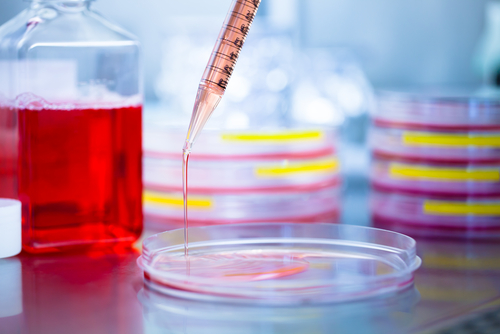Artificial Protein Could Be New Therapeutic Tool for Gaucher Disease
Written by |

An artificial version of the protein progranulin could reverse most cellular defects found in Gaucher disease, according to study led by researchers at NYU Langone Medical Center.
Gaucher disease (GD), a rare condition characterized by the inability of cells to break down fats, presents many symptoms including enlarged spleen and liver, blood disorders, joint pain, and severe bone alterations. Gaucher can be classified in three types based on the presence of neurological symptoms.
At the cellular level, Gaucher is caused by a genetic abnormality that induces the misplaced accumulation of the enzyme beta-glucocerebrosidase (GBA) outside of cellular structures called lysosomes, which process fats and removes cellular waste from inside cells. It is believed that Gaucher patients have abnormally low levels of progranulin.
The study, “Progranulin Recruits HSP70 to β-Glucocerebrosidase and is Therapeutic Against Gaucher Disease,” published in the journal EBioMedicine, showed that the artificial version of progranulin might reverse most effects of Gaucher disease. It has already decreased GBA accumulation in experiments using mice and human cells.
“Our results suggest a new way to treat Gaucher disease that corrects abnormal enzyme delivery by progranulin to lysosomes, as opposed to current treatment strategies that temporarily replenish lysosomal GBA stores, which are then steadily consumed,” senior investigator Chuanju Liu, PhD, a professor in the Departments of Orthopedic Surgery and Cell Biology at NYU Langone, said in a press release.
For progranulin to transport the GBA to lysosomes it needs to bind to a specific protein — the protective “heat shock” protein 70, according to the study. This process will prevent GBA molecules from sticking together outside of the lysosomes.
Researchers also found that adding the artificial progranulin to blood cells from Gaucher disease patients induced a 40% reduction of GBA clumping within a week.
In more severe type 1 Gaucher cases, low progranulin had been tied to lung swelling in asthmatics. The new study showed reduced swelling of lung tissues by 60% in animal models.
Lui maintains that future research that might reveal exactly how progranulin reduces cell swelling would likely lead to new and better therapy targets for Gaucher disease.



